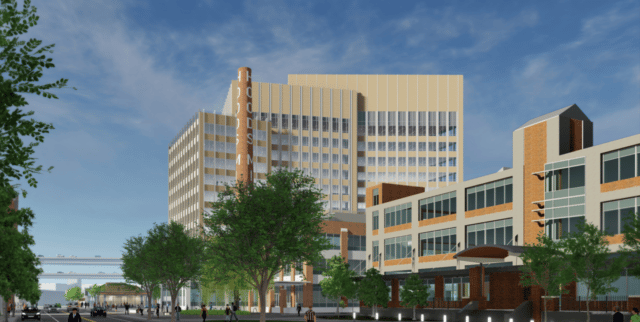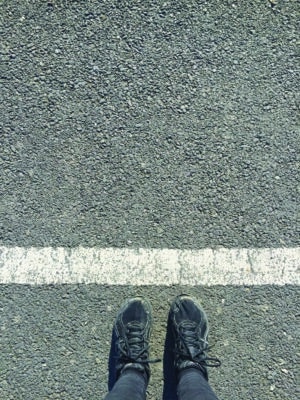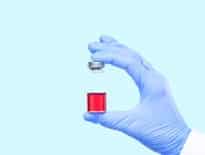Greater Boston’s massive life science real estate boom largely bypassed Somerville and Charlestown in recent years as growing firms gravitated toward western suburbs instead.
But migratory patterns are likely to shift in the near future as developers roll out a series of lab towers at tired commercial sites in Assembly Square, Boynton Yards and Hood Park.
“We think this is the next layer of the onion, as you’re peeling away from MIT and the Kendall Square area,” said Mark Rosenshein, a partner at Trademark Partners advising Hood Park’s owners on their 1.7 million-square-foot master-planned project.
Local brokerages are tracking approximately 2 million square feet of life science space requirements by companies in Greater Boston. But few firms are likely to find or afford near-term landing spots in industry hub East Cambridge, where asking rents are approaching $100 per square foot and the vacancy rate is 1.1 percent, according to Newmark Knight Frank research.
Uncertainty about future demand for office space – which has slowed new leasing to a trickle since the March arrival of COVID-19 – has made lab development more attractive than ever. Rents for life science space have approximately doubled in secondary markets such as West Cambridge and Watertown in recent years, and emerging submarkets such as Somerville and Charlestown are expected to compete with those prices. The 101 South St. development in Somerville is seeking rents over $80 per square foot, according to an industry source.
Developers eager to offer Kendall Square alternatives and capture the highest rents per property type in today’s market are laying the groundwork for an emerging industry cluster at a pair of transit-friendly neighborhoods in Somerville and the Hood Park campus in Charlestown.
Lab Shell Space Completed at Hood Park
This month marked the completion of a key element of Hood Park’s transformation from low-rise office park to a mixed-use development. Owner Catamount Management completed 100 Park Drive, an 880-space parking garage containing up to 54,000 square feet of shell R&D space on the first two levels.
Catamount also is seeking a minimum lease of approximately 100,000 square feet to kick off construction of 100 Stack St., a 350,000-square-foot office-lab tower, Rosenshein said. The parking levels were designed to offer conversion to office-lab space, and the building structure is designed to accommodate a vertical expansion up to an additional 12 stories of office-lab space.
Other approved elements of the master plan include a 157,000-square-foot office-lab building at 30 Stack St., a 276,000-square-foot office-residential building and a hotel. A 3,500-square-foot amenity building including bike storage and a roof deck is under construction at 10 Stack St.

After being overshadowed by explosive life science growth in West Cambridge and Watertown, development sites closer to Kendall Square in Somerville and Charlestown are expected to attract interest from biopharma firms in coming years. Catamount Management is seeking an approximately 100,000-square-foot lease to begin construction of its 10 Stack St. office-lab tower at Hood Park. Image courtesy of SMMA
Apartments Swapped for Labs at Assembly
Two development teams are seeking approval for a combined 2.6 million square feet of mixed-use development in Somerville’s Assembly Square and Boynton Yards, both with a heavy life science component. San Diego-based BioMed Realty is set to replace an aging office building and parking lot next to Assembly Row with 1.6 million square feet of commercial space.
BioMed agreed to buy the Xmbly property from owners Cresset Group and Novaya Real Estate Ventures, which acquired the 5 Middlesex Ave. property in 2018 for $35 million. The Cresset-Novaya team kicked off permitting for a mixed-use development before agreeing to sell to life science specialist BioMed, which owns 3.5 million square feet of office, lab and incubator space in Cambridge.
Pending MEPA approval, BioMed plans to close on the property and break ground as soon as fall 2021 on the first 420,000-square-foot lab building at Xmbly, Vice President of Development Sal Zinno said. BioMed received local approval in June to add 100,000 square feet of lab space to the 1.5 million-square-foot master plan, while eliminating a 167-unit apartment tower.
“We’ve seen an incredible amount of energy in the life science space and more requirements and funding in COVID-19,” said Colleen O’Connor, vice president of leasing for BioMed Realty.
An Incentive to Build on Speculation
Life science developers that have kicked off construction without a lease commitment have scored a series of successes in Greater Boston, reflecting life science companies’ need to expand soon after receiving funding.
“Early- and mid-stage companies get a round of funding or partnership with big pharma and need to scale quickly,” said Aaron Jodka, managing director of research for Colliers International in Boston. “They’re not able to sign a deal for 18 months out. There’s an incentive to build on speculation, because that is the nature of that particular tenancy.”
Cambridge-based companies received $1.1 billion in the second quarter alone, according to MassInvestor, a trade publication that tracks private equity and venture capital activity.
BioMed has not decided whether to break ground on a speculative basis Zinno said. But the development plan is designed to attract life science firms in a range of business stages, including 80,000 square feet that will be marketed as innovation space.
“It’s an opportunity to create a full ecosystem there,” Zinno said. “It’s not a one-off.”

Steve Adams
Near Union Square, another development team opted to launch the first lab building on speculation last year as it seeks approval for a 1.1 million-square-foot development. The 289,000-square-foot 101 South St. tower will provide wet and dry R&D space and column-free floor plates. The mid-2021 completion date is just months ahead of when the first Green Line trolleys are scheduled to start rolling through the neighborhood.
The partnership of Leggat McCall Properties and DLJ Real Estate Partners is proposing a 1.1 million-square-foot development on the nearly 7-acre site surrounding the building, part of which it acquired last year from Gentle Giant Movers.
“You have two very different but appealing sites,” said Brendan Carroll, director of business intelligence at Cushman & Wakefield in Boston. “In Boynton Yards, you’re surrounded by a densely settled neighborhood and very skilled and educated population in all directions, so it seems like a natural extension to what’s going on in Cambridge.”




 |
| 

